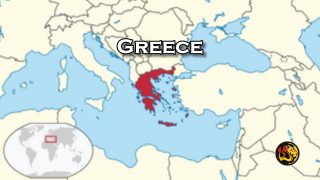
By Stefan J. Bos, Chief International Correspondent Worthy News
ATHENS (Worthy News) – Massive protests were underway in Greece on Friday on the second adversary of the nation’s deadliest train crash after a report blamed human error, outdated infrastructure, and significant systemic failures for the head-on collision killing 57 people.
Evdokia Tsagli told reporters she remembers laughing moments before her train wagon spun through the air. The ordeal lasted seven seconds. For Tsagli, “It was like eternity.” “I think I said over 100 times to myself, ‘When is it gonna stop?'” she recalled.
On February 28, 2023, her carriage in a Greek passenger train landed on top of the dining car ahead, flames consuming the wreckage.
The train, carrying hundreds — many of them university students — collided head-on with a freight train near Tempe, 375 kilometers (235 miles) north of Athens, the capital.
An independent 178-page report written by an independent investigative committee found that a station master’s routing mistake sent the passenger train onto the same track as an oncoming freight train.
The collision, which killed 46 passengers and 11 staff, including both train drivers, left many survivors with physical and mental wounds that will take long to heal.
Investigators also highlighted poor training, staff shortages, and a deteriorating railway system that lacked automated safety controls, noting a chronic lack of public investment during the 2010-18 financial crisis.
That did little to prevent protests on Friday, with thousands expected to remember the victims and pressure authorities to improve infrastructure.
Copyright 1999-2026 Worthy News. This article was originally published on Worthy News and was reproduced with permission.
Latest News from Worthy News
Senior Hamas leader Khaled Mashaal on Sunday reaffirmed the terrorist group’s refusal to disarm, rejecting demands from U.S. President Donald Trump and vowing to continue the fight against Israel.
The U.S. government added $696 billion to the national debt over the past four months, borrowing $94 billion in the month of January alone, the Congressional Budget Office reports.
Anti-ICE protests continued in Minneapolis over the weekend, resulting in dozens of arrests by local law enforcement.
Authorities across North Africa and southern Europe remained on high alert Monday after powerful storms killed numerous people and forced the evacuation of more than 160,000 residents.
Ukraine’s foreign minister has warned that intensified Russian attacks on his country’s energy infrastructure are creating a direct risk of a nuclear incident that could affect all of Europe.
Official results confirmed Monday that Socialist Party candidate António José Seguro won Portugal’s presidential election with 66.7 percent of the vote, defeating André Ventura of the right-wing nationalist Chega (“Enough”) party.
Despite what advocates describe as decades of persecution, discrimination, and insecurity, Pakistan’s Christians remain steadfast in their faith and committed to peaceful coexistence, a leading Christian rights advocate said Friday.







